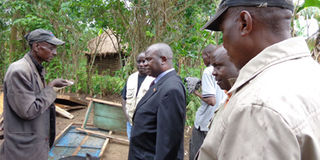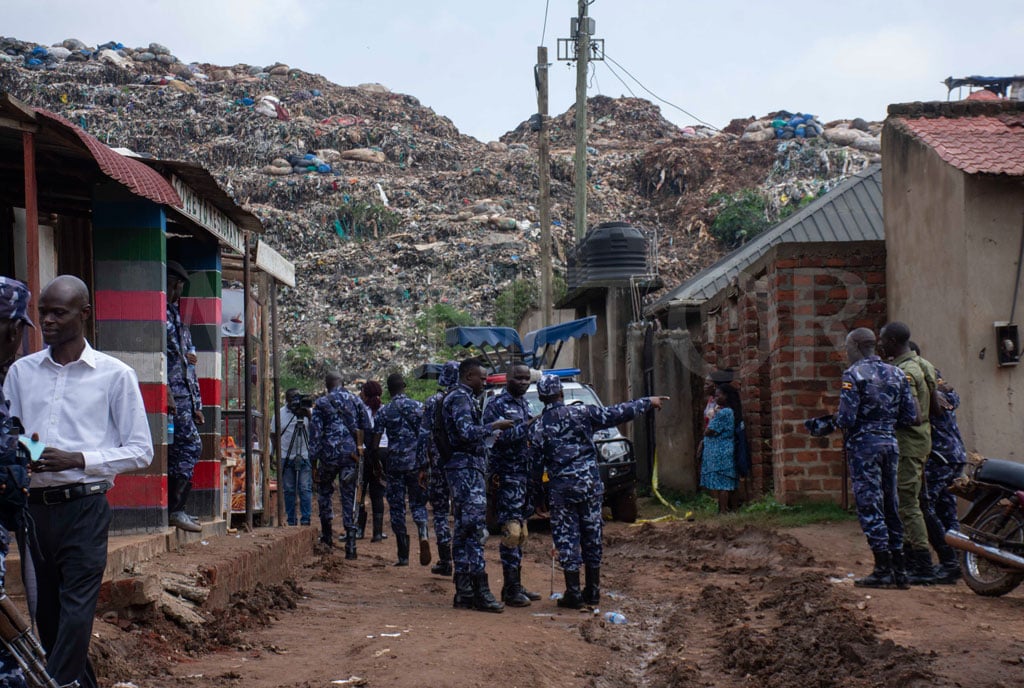Prime
Land evictions create anxiety in Bunyoro

A man claiming to have been evicted narrates his ordeal to the Bunyoro Affairs state minister Ernest Kiiza (C) recently. Photo by Francis Mugerwa
BULIISA/HOIMA- Sarah Nyanjura, 28, a resident of Bukinda village in Kyangwali Sub-county in Hoima District had planned to give birth at Kituuti Health Centre, about 14 kilometres away.
However, before she could set off to the health facility, residents of her village were reportedly directed to vacate the area.
Her husband, John Tumusiime, said her wife picked a few of the household essentials together with her three children and set off to seek refuge at Kyangwali Sub-county headquarters.
“We did not have an alternative piece of land where to relocate. We had lived on the land for more than nine years. We were shocked when we were told to leave the area,” Tumusiime says.
A few minutes after arriving at the sub-county, Nyanjura developed labour pains and gave birth to a baby girl on September 4. She is now unsure of her future and that of her baby and the other young ones.
Numbers affected
She is among more than 20,000 residents who were evicted from a piece of land said to belong to Kyangwali refugee camp to pave way for the relocation of thousands of Congolese refugees displaced by civil war in eastern DRC in July.
The sub-county chairperson, Mr Omuhereza Mazirane, claims the land is owned by natives who have lived there since time immemorial.
However, investigations by this newspaper point to a possibility of the land having been donated by Bunyoro Kingdom to the government for settlement of refugees in the 1960s.
“Bunyoro Kingdom land board has given us land for the above scheme to be started as soon as possible. Otherwise, they will be at liberty to make the land available for any other scheme other than the refugee scheme. The only thing required now is your approval for the scheme so that the refugee officer posted to Bunyoro recently may go ahead with preparations,” Sr Nyabongo, a community development officer in the ministry of planning wrote to the permanent secretary in the Ministry of planning on February 10, 1996.
Kyangwali Sub-county has Kingfisher Oil Field which has attracted a rush for land acquisition in the area.
Last month, Prime Minister Amama Mbabazi instituted an inter ministerial committee led by the Disaster Preparedness minister Hillary Onek that visited the evicted residents and the refugees last month.
“During that meeting, I directed that nationals be reinstated from where they were evicted, after refugees have been relocated within the resettlement,” Mr Onek wrote to the Hoima RDC, Ms Jeane Kaliba, on September 26.
He said whereas he has been informed that the area sub-county chairperson has ordered nationals to return to Bukinda village, this is contrary to the understanding that the verification team will have to verify and ascertain bonafide occupants.
“The government position was that an orderly resettlement of the displaced citizens be done when refugees have been relocated for security reasons. The resettlement of nationals should be done under the framework of the verification committee to be headed by Maj Gen Oketta,” Mr Onek added in his letter.
Land grabbing worries
People in Bunyoro sub-region are becoming anxious over increasing cases of land grabbing. Indigenous communities in the Albertine Grabben, where oil firms are exploring for oil, have also repeatedly complained about the circumstances under which oil firms utilise their land.
The Bunyoro Kingdom’s deputy prime minister, Mr Blasio Mugasa, said the kingdom has received reports from its subjects who claim that oil firms have set up oil well pads, camps and constructed access roads through communal grazing areas.
Oil firms, however, claim they do not own or purchase land. They argue that as government contractors, it is the government that secures the land where the firms operate.
Tullow Oil, one of the firms exploring for oil, in a response to land complaints in its area of operation, said it is mandatory for oil companies in Uganda to comply strictly with the government compensation rates and procedures governing land, immovable property and crops.
“Compensation is paid for long-term land use while rentals are paid to land owners for temporary use. There are no rental payments outstanding to any projected affected persons,” Tullow responded in a recent e-mail inquiry from this newspaper through its public relations agency, Fireworks.
That notwithstanding, Tullow said there are cases where multiple stakeholders within a claimant family disagree on the apportionment of compensation and rental payments, resulting in occasional complaints that are not well founded.
Mr Mugasa says many people remain squatters on their ancestral land.
“Bunyoro Kingdom requests the government to implement a systematic demarcation and titling of land which will enable it and its people to access land titles,” he says.
Eviction threats
However, even in cases where some landlords have land titles, there have been disputes and threats of evictions against tenants.
Bunyoro Affairs state minister Ernest Kiiza has already halted the eviction of more than 5,000 residents from Kasongoire Parish in Bujenje County after Mr Francis Bitamale, and his son William Bitamale, both residents of Kimanya I village, claimed to have acquired land tittles of 720 hectares of land in 2008, using a lease offer of 1972.
The residents who petitioned the minister alleged that Mr Bitamale dubiously surveyed their land at night and planted mark stones in their land without their knowledge and consent. Mr Bitamale insists he legally owns the land.
Mr Kiiza says the government is investigating the fraudulent land deals.
“The President and Cabinet have taken a strong stand against illegal land deals. We shall not accept the rich to take advantage of the poor to illegally evict them from their respective pieces of land,” says Mr Kiiza.
He says investigations have already commenced in Hoima and Masindi districts and will cover all the districts in Bunyoro.
Uganda’s oil exploration prospects so far
From the 1980s, efforts to develop Uganda’s petroleum prospects were taken by government.
These efforts included the enactment of the Petroleum Exploration and Production Act, 1985, formation of the Petroleum Exploration and Production Department in 1991, formulation of the Petroleum Exploration and Production Regulations, 1993 and licensing of Exploration Area 3 to Heritage Oil & Gas Limited.
Others involved the acquisition of 2D seismic data in 1998, drilling of Turaco Wells in 2002 –to 2004; licensing EA2 to Hardman (now Tullow), others to Heritage Oil & Gas and Neptune in 2001 – 2006.
The period, 2007 – 2011, was marked by formulation of the National Oil and Gas Policy, 2008; updating the oil and gas legislation by developing the Petroleum Bill 2012 and the Petroleum Bill 2012. Continued exploration is on and more discoveries are anticipated.
The first commercially viable oil reserves were discovered at Mputa by Hardman in 2006. From then and by the time of preparing this Strategic Plan, 68 exploration and appraisal wells had been drilled, of which 58 were successful discoveries.
This represents an oil discovery success rate of 85.3 per cent, which is the highest worldwide Uganda is therefore poised to join oil giants in the production of oil and gas and this can offer the country such a dramatic turn on her course to socio-economic transformation.
Rush for land
Various investors are rushing to acquire land in the region to set up projects that can target the supply chain of the lucrative petroleum industry.
According to a recent research conducted by Uganda Land Alliance, lease applications in Hoima have been increasing since the discovery of oil. In 2005, there were only 14 applications but by 2006, the number had increased to 183. In 2007, the number went to 723, before reaching 1,234 in 2008 and falling to 985 in 2009.




